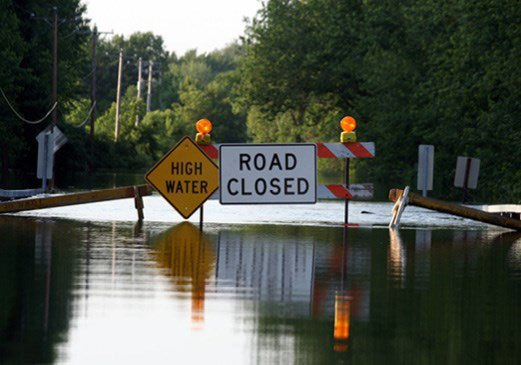6 steps to follow in the event of a flood
Floods can occur anywhere during any season of the year. While some floods can take days to develop, others – such as flash floods – can occur in minutes.
According to the National Weather Service, over 140 deaths per year are caused by flash floods and floods that are associated with thunderstorms. Each year, floods cause an average of $4.6 billion in damage to homes and businesses.
In the event of a flood, it’s important to remember these six tips, especially if your home uses propane. Being prepared and having a plan for your family to follow is an important part of staying safe and avoiding possible dangers.
- In flood zone areas, make sure your large above-ground and underground propane tanks are anchored securely to avoid potentially dangerous situations. The National Fire Protection Association (NFPA) requires that you do this. Contact your local Ferrellgas office for more information if you have questions.
- Have an adequate supply of propane in your tank. During and after a major flood, propane and other types of fuel may not be readily available and roads leading to your home or farm might not be accessible for delivery. We recommend contacting your local Ferrellgas office to schedule a fill when your tank reaches 30 percent.
- In the event that a flood threatens your safety, you should shut off the gas. Turn off the main gas supply valve on your propane tank, if it is safe to do so. To close the valve, turn it to the right (clockwise). Also, it’s a good idea to turn off the gas supply valves located near individual indoor appliances. You may have to evacuate your property or move to a higher level within your home.

- After the flood danger passes and it is safe to do so, check the entire area for downed power lines, damaged gas lines, or damage to your propane tank. Floods can move, shift, or damage gas lines and tanks. If it is dark, use flashlights, not candles. Immediately call your local utility company or Ferrellgas if any of these hazards exist. Do not attempt repairs yourself. If you find a propane tank on your property that is not yours, or if your propane tank has become dislodged or is missing, contact your local Ferrellgas office or your local fire department immediately.
- Inspect your propane appliances for water or other damage, if it is safe to do so. If the appliances have electric components and have been exposed to water, they can create a fire hazard. Do not ever turn on a light switch, use any power source, or inspect your household appliances while standing in water. This can result in electrocution.
- Exercise sound judgment. As with any challenging situation, your composure during floods and other severe weather events will ensure you don’t take unnecessary risks or pose any additional dangers to your family and home. Stay calm; use radios, television, and telephones to stay informed and connected.
Information in this blog provided by the Propane Education & Research Council.
CATEGORIES
Archives
- Summer 2025
- Spring 2025
- Winter 2024
- Fall 2024
- Summer 2024
- Spring 2024
- Winter 2023
- Fall 2023
- Summer 2023
- Spring 2023
- Winter 2022
- Fall 2022
- Summer 2022
- Spring 2022
- Winter 2021
- Fall 2021
- Summer 2021
- Spring 2021
- Winter 2020
- Fall 2020
- Summer 2020
- Spring 2020
- Winter 2019
- Fall 2019
- Summer 2019
- Spring 2019
- Winter 2018
- Fall 2018
- Summer 2018
- Spring 2018
- Winter 2017
